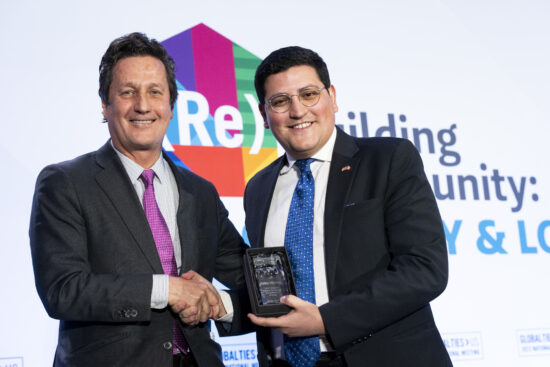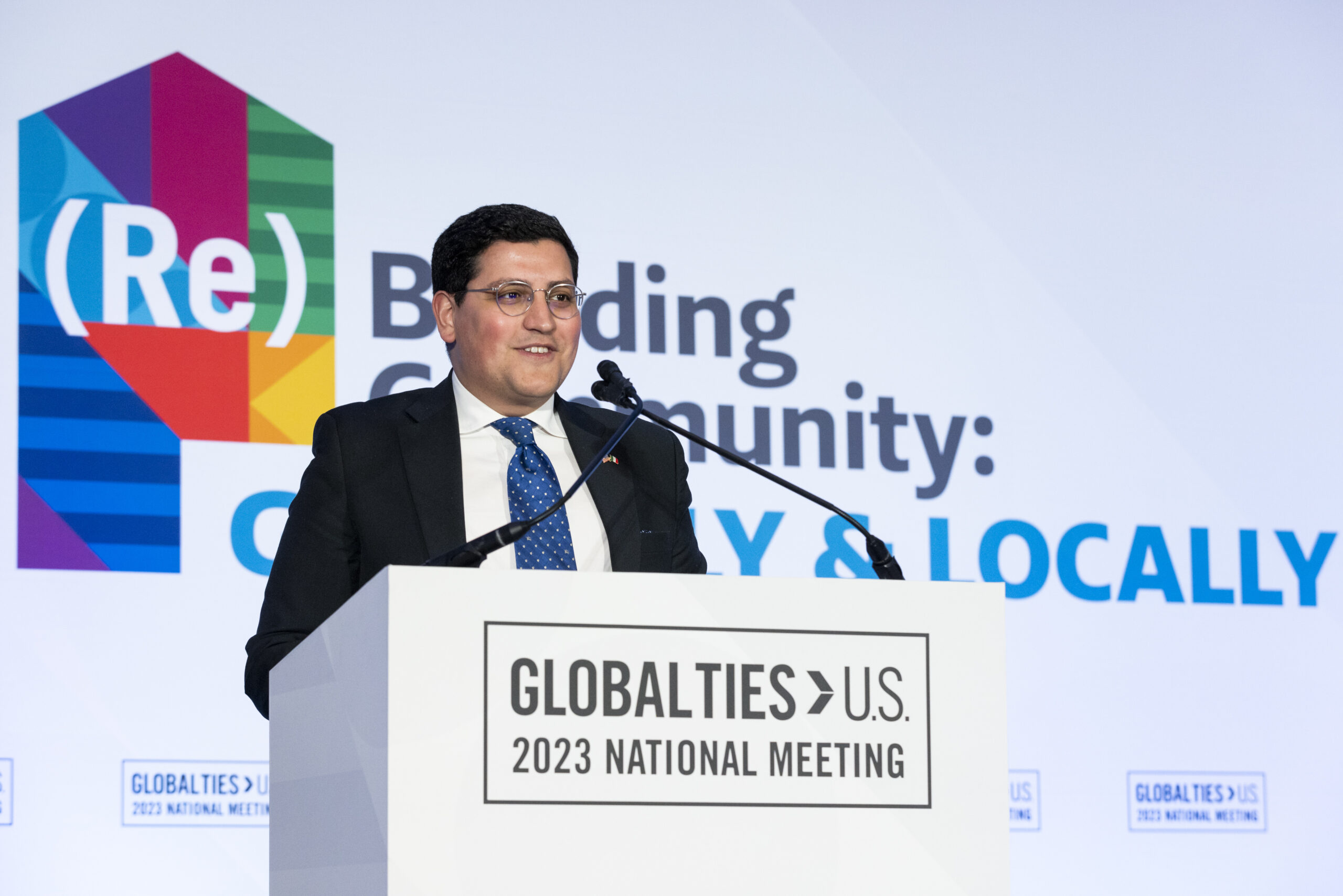Anass Hanafi is a social activist from Turin, Italy. He is also the Founder and President of NILI (Italian Inclusion Leaders Network), where he works to increase access to opportunities for those who are otherwise excluded or underserved; and recipient of the Global Ties U.S. 2023 IVLP Alumni Award for Social Innovation and Change. We spoke with Anass about civic engagement, his motivation to build community through citizen diplomacy, and how his IVLP experience shaped his work.
Anass participated in the 2021 virtual International Visitor Leadership Program (IVLP) “Current U.S. Social, Political, and Economic Issues for Young European Leaders,” programmed by World Learning (Washington, DC) in coordination with Global Ties Kalamazoo (Kalamazoo, MI), San Antonio Council for International Visitors (San Antonio, TX), and WorldOrlando (Orlando, FL).

Anass Hanafi receives the 2023 IVLP Alumni Award for Social Innovation & Change at the 2023 National Meeting. Photos by Kristoffer Tripplaar.
During your 2023 National Meeting keynote address, you spoke about your work with the Italian Inclusion Leaders Network (NILI). Could you talk about what inspired NILI and how you turned your initial vision into the strong network NILI has become today?
Three decades ago, my family made the bold choice to move from Morocco to Italy. Growing up in Italy, I discovered a rich tapestry of identities within myself, being Italian, Moroccan, and Muslim. However, society often viewed these identities not as strengths, but as liabilities. Throughout my journey, I connected with numerous young individuals grappling with similar challenges. It sparked a deep reflection on building bridges and finding common ground.
I had the privilege of participating in a transformative training program, generously supported by the German Marshall Fund of the United States. This experience equipped me with the tools to adopt a long-term perspective and assess my impact. Inspired by this, we crafted a training initiative focused on reinvigorating Italian identity through a celebration of our historical heritage, particularly the impactful Risorgimento period. Thus we created NILI! My goal is to channel the generous help my family received from Italy by empowering the next generation through similar transformative experiences.
What are some of NILI’s most notable outcomes? Are there any success stories from the young leaders in the network that stand out to you as examples of NILI’s impact?
We designed a comprehensive training program encompassing lobbying and advocacy, honing our public communication skills, mastering community organizing, and cultivating the ability to discern fake news. Over 100 individuals benefited from our training, fostering a robust network where they could lean on one another. We linked them with inspirational role models across Italy and Europe.
Our focus extended to diversity, equity, and inclusion, forging partnerships with various local NGOs to amplify the impact of our fellows at the grassroots level. Some participants secured positions in city councils, while others seized opportunities to run within their political parties. Some chose to embark on careers as political consultants, while others continued contributing to the private sector. The overarching goal was to establish a fellowship where shared objectives unite members, providing support whenever needed.
How did participating in the IVLP shape your work in the areas of increasing civic participation, building a more inclusive and equitable society, and strengthening the sense of belonging and community?
This program reinforced my belief in the importance of building bridges between cultures and fostering international understanding. It taught me that regardless of our differences, we all share a common humanity and can work together to achieve common goals. But more importantly, the International Visitor Leadership Program reinforced my belief in the power of people-to-people exchange. I saw firsthand how this program fostered relationships between individuals and how those relationships, in turn, led to partnerships, collaborations, and enduring friendships. It was a reminder that no matter our differences, we share a common humanity and can work together to achieve common goals.

In addition to continued service as president of NILI, you are also a trainee lawyer and LLM student focusing on international space law. You are a fellow at the German Marshall Fund’s Transatlantic Inclusion Leaders Network, and the World Economic Forum Global Shapers Community’s Turin Hub. You have created several think tanks at the university. What’s next for you? What role will mentoring young leaders and promoting equity and inclusion play in your work going forward?
The aim is to persist in our efforts and motivate others to establish networks akin to ours. I perceive my work as a catalyst, akin to a stone cast into a vast lake, with the ensuing ripples representing the direct outcomes of that action. My commitment is to shape a lasting legacy, perpetuating the focus on equity and inclusion and nurturing emerging leadership in both Italy and Europe. This interconnected community will be facilitated through the integration of innovation and technology.
What advice do you have for young leaders seeking avenues to promote diversity, equity, and inclusion and facilitate positive social change in their local and global communities?
Start by establishing connections with your local community and forging bridges between your community and others nearby. Adopt a mindset that thinks globally but acts locally. Focus on building a community, starting with a small group of three or four friends, and strive to make a tangible impact while also assessing and measuring it. Identify someone who is already making a positive difference and reach out to them. Collaborating with such individuals allows you to learn and acquire the skills needed to uplift and improve your community. Change begins with us.
